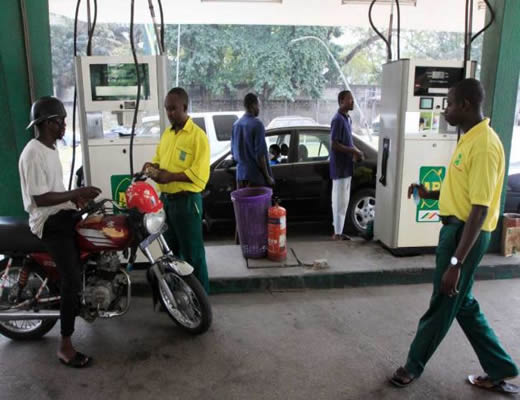Many motorists have reduced their patronage of filling stations to buy petrol following the sharp increase of petrol from N195 per litre to N537 in the Federal Capital Territory.
The increase in price by NNPC was caused by the removal of fuel subsidy by President Bola Tinubu.
Checks by Daily Trust on Wednesday revealed that due to the N537 new pump price of fuel introduced by the Nigerian National Petroleum Corporation Limited (NNPCL), many filling stations in the territory now record fewer customers.
In most of the stations, the product was available but motorists bought less petrol, describing full tank purchases as avoidable luxury.
It was learnt many others had parked their vehicles at home, while others used theirs when it was absolutely necessary.
Civil servants who could not afford to go out have resorted to staying at home even without permission from their employers.
FG to incur additional N2trn liabilities as Senate passes Police Pension Bill
Those who have personal businesses only go out when there are no options; a development that has rendered highways less busy.
A manager at a filling station in Kano who pleaded anonymity, said they used to sell out their stock within two days before, but “it is now a week and we still have the commodity.
“If you see anyone filling up his tank, look at the type of the car, it will definitely belong to a government official, politician or an influential person.”
Pump attendants at some filling stations described the new development as “scary”, saying patronage had dropped by over 50 per cent.
Adeyemi Joy, an attendant at Shema Filling Station along Kubwa-Zuba Expressway, said “Many of our customers now buy between N5, 000 and N10, 000 fuel and this is below half tank considering the current price.”
Another fuel attendant who did not want his name in print, said, “It is a surprise to us that most of our big customers who used to be regular here have not been regular anymore since the fuel price increase. Even when they come, they no longer pay to fill their tanks.”
In a tweet Wednesday, leading activist and founder of ANAP Foundation, Atedo Peterside said “Let us watch NNPC Limited daily consumption figures collapse as the component parts of the old figures were – real domestic consumption, petrol smuggled across the border and non-existent petrol that only existed because it was assigned to bogus subsidy claims.”
Workers in some agencies in Abuja now skip days due to the high transport fares.
Fewer vehicles were seen on the streets as most car owners have parked their vehicles. The situation was the same in Kano, Zamfara, Ekiti and Lagos states.
Our correspondent in Kano reports that many car owners were considering the option of substituting their cars with motorcycles or battery powered bicycles. In a visit to Audu Bako Secretariat, a civil servant told our reporter that most of the vehicles belonging to the junior staff of the ministry have been grounded.
“You know how a junior worker is, especially one under a state government payroll. Normally, they hardly drive their cars for 30 days straight without parking them to wait for their salary.
“Now that we are experiencing this high price of fuel, most of them have grounded their vehicles while some of them are looking at alternative means – to sell them and replace them with motorcycles.”
Faisal Ali, who works with one of the local government areas in Kano, said they have started skipping attendance.
“It has not been institutionalised but our superiors are not complaining. Many of us now go to the office two or three times a week.
“Those whose work is inevitable in the office are being supported by the superiors,” he said.
The level of patronage at filling stations in Ekiti State is very low due to the hike in the price of petrol.
However, the majority of the stations do not sell in the daytime but prefer to sell late in the evening at higher prices between N600 and N650.
Our correspondent reports that the situation is biting harder on workers as they don’t resume at the normal time. Some stay on the road to see who will assist them to get to the nearest point to get to their destination or office.
Many offices were virtually empty as only a few workers were seen around.
More on Daily Trust




